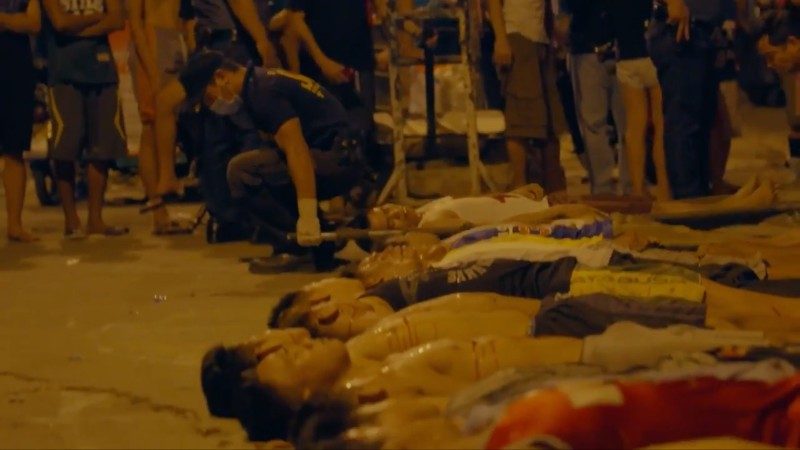SUMMARY
This is AI generated summarization, which may have errors. For context, always refer to the full article.

Details are what make Brillante Mendoza’s Alpha: The Right to Kill more than just your regular Duterte-age drug flick.
Here, drugs aren’t just simply peddled by scrawny ragamuffins in dark and dank alleyways. Instead, plastic pouches of meth are put inside juicy mangoes, transported by trusty pigeons, and sewn into the linings of baby diapers.
It may be true that the motive of Mendoza is to put a light on the unlikely truths of Manila’s underseen underbelly. However, it also wouldn’t be inaccurate to say that Mendoza can smell the cinematic value of emphasizing the alarming resourcefulness of the drug dealers born and bred in his very own third-world backyard.
Festival circuit and Netflix
If anything, Alpha: The Right to Kill reveals Mendoza as a far more technically sophisticated filmmaker.
He has learned everything he needs to know from the festival circuit and Netflix. Alpha is probably the sleekest a Mendoza film could get. The editing is much brisker, with an early sequence where drug dealers are busted in an operation infused with an energy that is not unlike the one in Erik Matti’s similarly themed BuyBust (2018).
Mendoza’s camera swings, wafts, and jitters with a lot more purpose. The camera’s jarring movements are less the result of the necessity of utilizing a hand-held camera and more as part of a meticulous design. Mendoza has clearly mastered the slums-set aesthetic that he has sold so successfully to the world.
Mendoza is still keen in sensing his society’s ironies. In fact, Alpha opens with one that offers it bluntly and brashly.
After an asset successfully purchases packets of crystal meth from a dealer who masquerades as a fruit vendor, a cop (Allen Dizon) suddenly starts a chase through the narrow aisles of a market. Obviously, the wild ruckus interrupts the trade, with all of the vendors getting alarmed by the sudden spurt of chaos. Seconds later, the vendors get back to their respective deals and transactions – showing that these kinds of raids have become so routine and commonplace within the community.
Advances in craft
Sadly, Alpha, despite all the advances in Mendoza’s craft, feels old.
In essence, Alpha is another one of Mendoza’s deep dives into how the police system breeds corruption. Kinatay (2009) depicts a novice’s initiation into the world of cops committing the most heinous of crimes. While Lola (2009) centers the circuitous judicial system, it also implicates the police and its many inefficiencies. Amo (2018), the Netflix-funded series that maps the Philippines’ drug problem, exposes the rot that has infested the police as part and parcel of the glaring dilemma. Ma’ Rosa (2018) is set almost entirely inside a police compound, revealing all the abuses of law enforcers from the perspective of an offender.
What becomes apparent with Alpha is that Mendoza’s message never really matures. Like the market-set raids that causes a momentary stir in business but eventually settles with everyone going about as if nothing ever happened. Mendoza’s films have become so rote by repetition.
What’s worse is that while he is still armed with a thirst for truth, that thirst has lost a certain courage, more specifically, in the way the corruption he depicts seems disconnected with current politics. While Mendoza’s confidence as a filmmaker has grown, his courage as an advocate has sorely mellowed.
Alpha is a film made by a filmmaker who knows the country he is depicting is divided.
It is a film that seeks to please all sides and in turn, delivers a point that is made blunt by concessions and compromises. Duterte is shown only once, on a faulty television set, while awarding a general. Whenever the cops are facing the press, any mention of the drugs war being a government initiative is curiously absent.
It is almost as if Mendoza is portraying the glaring rot in isolation of everything else that is happening.
When the film does finally connect the small-time graft to high-ranking officials, it never feels like it bravely takes a stand but instead blames a bad system that has become emboldened by questionable chains of command and even more questionable modes of meritocracy.
What is most troubling in Alpha is how Mendoza, who is clearly cognizant of the system’s failures, doesn’t express any anger in all the lives lost in a glaringly ineffective war. His film is critical of the police but is too concerned of not ruffling any important feathers that is neglects being critical of Duterte’s drug war which is being spearheaded by the police he indicts.
Advocacy for truth
The best thing about Alpha is a dim and grimy light on how society has become so apathetic to humanity because of the proliferation of drugs. Alpha however shines a clear spotlight on how an aim to placate both sides has dimmed and grimed Mendoza and his advocacy for truth.
The devil is in the details, or the shocking lack thereof. – Rappler.com

Francis Joseph Cruz litigates for a living and writes about cinema for fun. The first Filipino movie he saw in the theaters was Carlo J. Caparas’ Tirad Pass.
Since then, he’s been on a mission to find better memories with Philippine cinema.
Add a comment
How does this make you feel?
There are no comments yet. Add your comment to start the conversation.